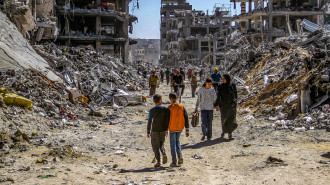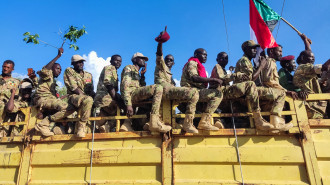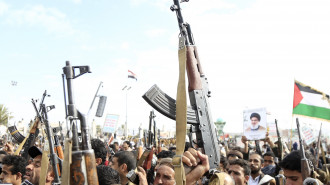Yemen in Focus: Houthis' ceasefire a 'deception tactic' for Saudi Aramco attacks
The rebels said late on Friday night that they were halting drone and missile attacks against Saudi Arabia. It comes just one week after they claimed responsibility for a strike that crippled two key oil facilities in the kingdom, and which has since been blamed on Iran.
"We declare ceasing to target the Saudi Arabian territory with military drones, ballistic missiles and all other forms of weapons, and we wait for a reciprocal move from them," Mahdi al-Mashat, head of the Houthi's supreme political council, said on the Houthi-run Al Masirah TV.
"We reserve the right to respond if they fail to reciprocate positively to this initiative," he said, adding that the continuation of the Yemen war "will not benefit any side".
The rebel leader also called on all parties in the conflict to "engage in serious negotiations" to end the conflict that has claimed the lives of more than 91,000, according to figures by ACLED.
But the announcement, which has followed hundreds of Houthi cross-border strikes on the neighbouring kingdom in recent years, was met with suspicion, with many questioning the timing in particular.
"The Houthi announcement to halt attacks on Saudi Arabia could be genuine, since the Houthis have always attempted to frame the Yemen war between them and coalition member states, not the government," Ibrahim Jalal, Yemen and Gulf Analyst at Middle East Institute told The New Arab.
"In this sense, a Saudi reciprocity without credible conditions tied to the broader Yemeni peace process would cement Houthi sentiments of victory following the UAE's drawdown and remove aerial military pressure that constrained their ability to expand territorially, benefiting the rebel's mobilisation strategies and regrouping of forces for the next escalation," he said.
However, the timing, which comes amid a flare in Gulf tensions following the attack on Saudi's Aramco oil facilities, offers a different insight, Jalal suggested.
In fact, just days earlier, the Houthis themselves had vowed to escalate the conflict with increased attacks on the United Arab Emirates - a key component of the Saudi-led coalition battling the rebels in Yemen.
"The Houthi offer seems a deception tactic to reassert their highly questioned responsibility over the September 14 terrorist attack and buy Tehran, who's accused, more time following US' sanctions on the latter. In this vain, the Houthi announcement is a sign of Iranian ad-hoc de-escalation than an independent, genuine initiative. For sustainable peace in Yemen, neither is good news as they stand," Jalal said.
Yemen's warning
Meanwhile, Iran's President Hassan Rouhani said on Wednesday that the Yemenis targeted Saudi oil facilities as a "warning" about a possible wider war in response to the kingdom's US-backed intervention in the conflict-ravaged country.
"The Yemenis... haven't hit a hospital, they haven't hit a school, they haven't hit Sanaa bazaar. They just hit an industrial centre... to warn you," Rouhani said after a cabinet meeting.
"Learn lessons from this warning and consider that there could be a war in the region," he said, in a likely address to the rulers of Saudi Arabia which has spent billions of dollars on US weapons.
Saudi Arabia, which has been bogged down in a five-year war in Yemen, has said the weapons used in the attacks were Iranian-made but has not directly blamed its regional arch-rival for launching the attack.
On Saturday, Saudi Arabia's foreign ministry said if Iran carried out the attack on Aramco, it would be considered an act of war.
"We hold Iran responsible because the missiles and the drones that were fired at Saudi Arabia... were Iranian-built and Iranian-delivered," Minister of State for Foreign Affairs Adel al-Jubeir told CNN late on Saturday.
"But to launch an attack from your territory, if that is the case, puts us in a different category... this would be considered an act of war."
Revenge strikes
In any case, the Saudis have themselves dismissed the Houthi proposal to halt attacks and refused to reciprocate the sentiment.
On Monday, five members of a family were killed in an airstrike by Saudi-led coalition jets in Yemen's Amran province, Houthi rebel media reported, just days after their proposal to de-escalate violence.
The family had sought refuge in a mosque which was bombed by the pro-government coalition, according to Al Masirah TV.
Rescuers searched the building's rubble in search of two children from the same family who were missing, the report added.
A day prior to the Houthi announcement, the coalition launched a new military operation against the rebels north of Hodeida, Saudi media reported, in response to an explosive-laden boat attack launched by the militants.
The US-backed coalition said it had intercepted the unmanned boat rigged with explosives on Thursday.
The boat had been launched from the western port city of Hodeidah and was set to carry out a "imminent hostile and terrorist act" via remote control, the coalition claimed without specifying a target for the attack.
Shortly after capturing the Houthi-launched boat, Saudi-linked media reported that the coalition had launched a new military operation against the rebels in areas north of Hodeidah.
It said the operation would target what it described as "legitimate military targets" and urged civilians to stay away from the sites targeted.
The Saudi-led coalition intervened in Yemen in 2015 to support the country's government after the Iran-linked Houthi rebels swept out of their northern stronghold to seize Sanaa.
Fighting since then has already claimed tens of thousands of lives and sparked what the United Nations calls the world's worst humanitarian crisis.
Both pro-government forces and the Houthi rebels have been accused of committing war crimes.
The Saudi-led coalition has been blacklisted by the UN for the killing of children, while Riyadh and its allies accuse the Houthis of using civilians as human shields in densely populated areas.
Earlier this month, the Saudi-led coalition sparked further outrage over its war in Yemen when it targeted a Houthi-run prison, killing close to 130 people.
Amid global condemnation of the attack, the coalition denied it had deliberately targeted the prisoners, saying it was unaware that the area was being used as a detention centre.
Sana Uqba is a journalist at The New Arab.
Follow her on Twitter: @Sanasiino
Yemen In Focus is a new, regular feature from The New Arab.
Click below to see the full archive.





 Follow the Middle East's top stories in English at The New Arab on Google News
Follow the Middle East's top stories in English at The New Arab on Google News


